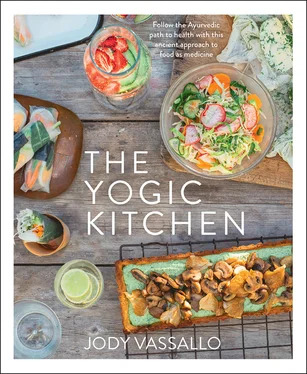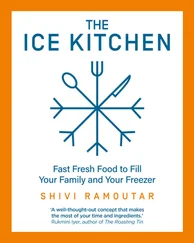Gross– Kaphas can suffer from fatty tissue, blockages and obesity.
Sweet– These people have a sweet nature, and are also drawn to sweet foods that can cause them to become unbalanced.
Salty– Salty taste will assist in digestion, however, too much salt can lead to fluid retention and this can often be a problem for Kaphas.
White– Kaphas have a pale complexion, they love white food especially dairy.
Lifestyle factors to limit– Too much sitting, excess exposure to damp and cold, lying around watching movies for extended periods and spending too much time alone.
Emotions and diet
Kaphas move slowly, speak slowly and don’t like being forced into making quick decisions. They have stable minds and a solid sense of self, but out of balance they can struggle with long episodes of depression and melancholy. These are very private individuals and often suffer alone, making everyone’s problems more important than their own. Kaphas’ first step in addressing their emotions is admitting to what they are feeling, as they often minimise their emotions or laugh them off. Giving themselves permission to cry or show their vulnerability to those they trust is a big thing for Kaphas, who tend to soldier on regardless.
Kapha types love sweet foods and will be the people who crave ice-cream or a sweet treat after dinner. Indulging in habits like this will only lead to weight gain, excess mucus and negative feelings about themselves.
For food that suits Kaphas, see the charts at the back of the book, pages 244–5.
Routine and exercise
For Kapha types to lead balanced lives, they need to challenge themselves and get out of their comfort zones. Often found talking about wanting to begin an exercise or weight-loss program, they need to just start. Once they start something they are the most dedicated and consistent of all the doshas and blessed with strong bodies that have great endurance.
They are natural earth mothers and some may find it difficult to let their children grow up and lead independent lives. Kaphas need to spend more time focusing on themselves and less on others.
Ayurveda is the science that indicates the appropriate and inappropriate, happy or sorrowful conditions of living, what is auspicious or inauspicious for longevity, as well as the measure of life itself.
–Charaka Samhita 1.41


STAGES OF LIFE AND AYURVEDIC SEASONS
It is not only food that affects our constitutions; the environment, time of day, time of year and the weather also have an effect. Certain elements are more dominant in our body at certain times of our lives, to the point where they can dominate or strongly affect our health. These phases (also known as stages) are also named, a little confusingly, as doshas. So you could be a Vata dosha going through a Kapha phase of life in Pitta weather (summer). See more about seasonal eating in The Ayurvedic approach to health chapter ( pages 42–6). If you are a blend of doshas or tridoshic (a balance of all three) this could become even more complicated, especially if you are cooking for a family with mixed doshas.
These stages of life are described beautifully in ancient Ayurvedic texts.
Kapha stage: 0 to 18 years – Student
Pitta stage: 18 to 50–55 years – Householder
Pitta Vata stage: 50–55 to 75 years – Hermitage
Vata stage: 75 years to death – Renunciation
The years in each stage are not fixed and will vary with each individual.
The Kapha stage is known as the ‘student’ phase of life as this is a time of learning and discovering boundaries and discipline. It is a time for building knowledge and intellect along with new tissues in the body. Mucus is the by-product of the manufacture of tissue and this is why young children, no matter what dosha they are, always seem to have an issue with mucus.
The Pitta phase can actually be divided into two phases. The first part of the Pitta phase is referred to as the ‘householder’ years where the focus of one’s life is on making your mark in the world, meeting a partner, creating a home and raising a family. This fire stage is mainly about working hard and building wealth, and we use the momentum and heat created in the body in these years to help us stay focused on the job at hand, and during this period we may feel more confident, sociable and ambitious. Because there is more heat in the body during these years we may also suffer with insomnia, skin issues, heartburn, stomach ulcers and hypertension.
The second half of the Pitta phase, also known as the Pitta Vata phase, is often referred to as the ‘hermitage’ stage and happens after 50 or 55 years where people start to let go of the attachments to money and fame and become more involved in helping others or focusing on their retirement. People may move to a quieter area and choose to live a simpler life but they are still available to family and their community for help and advice. During this phase people may show signs of both Pitta and Vata imbalance.
The Vata stage is known as the ‘renunciation’ stage where we are preparing for death. I know that sounds a little morbid but it can be an incredibly special time in one’s life. People in this phase, even if very mentally and physically active, start to become progressively more inward looking and less concerned with what is happening in the world around them; their body is now dominated by Vata so it becomes drier and colder and their digestion slows down. Joints may ache and they may become more forgetful, anxious and fearful.
The transition is slow and happens over several years, and people develop at different ages and stages. If we try to fight against these stages, it will quickly create imbalances in our bodies. In some ways the refusal of people in the west to gracefully accept and honour ageing and its natural phases could be seen as the cause of many of the health issues we are seeing today.
Issues that may arise during the Kapha years:stomach problems, congested lungs, blocked sinuses, runny noses.
Issues that may arise during the Pitta years:skin problems, acne, infection, inflammation, blood issues, headaches, migraines, liver problems, bile.
Issues that may arise during the Vata years:negativity around ageing, loss of flexibility and strength in the body, memory loss, dryness, loss of direction, osteoporosis, frailty, weakness of the immune system, joint pain.
Now that you know your dosha, or doshas, you can begin to work to nourish and look after yourself according to it and the stage of life you are in as well as being more aware of why you might be more susceptible to certain environments, seasons, changes to the weather and foods than others.
Added to that, I always recommend that people are mindful of the signs of Vata imbalance. We all have some level of Vata imbalance these days, which is the direct result of living busy lives in which we are exposed to way too much Vata unbalancing technology – phones, computers, ipads etc.
The main thing about this book is that you learn how to familiarise yourself with what isn’t working for you. If your doshas are strongly out of balance, then you may need to follow the chapter set aside for the dosha that is out of balance until you come back into balance and then you can return to following an eating and lifestyle regime that is more in line with your own constitution. (See page 22for Vata, page 27for Pitta and page 31for Kapha.)
Читать дальше














